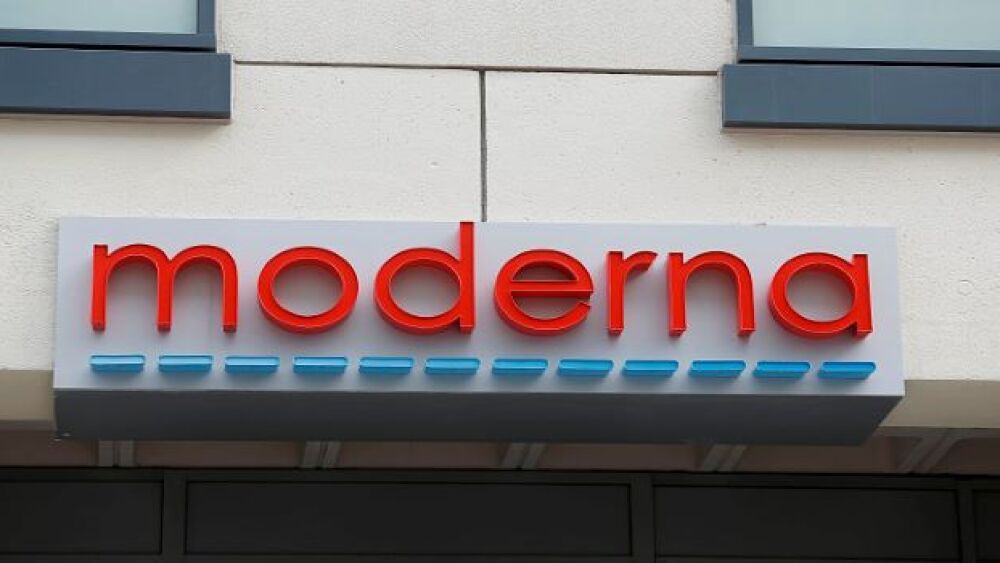As the COVID-19 market dries up, Moderna looks to FDA approval of its other vaccines including a 2024 commercial launch of its investigational RSV vaccine for older adults.
Pictured: Moderna sign adorns company building/Maddie Meyer/Getty Images
Wednesday’s FDA approval of the first RSV vaccine, GlaxoSmithKline’s Arexvy, for adults ages 60 and older, put the spotlight on a growing field of competitors. For its part, Moderna is preparing for a potential 2024 commercial launch of its investigational RSV vaccine for older adults.
The Massachusetts-based company reported earnings and regulatory plans in its first-quarter investor’s call on Thursday, providing an update on respiratory vaccines which continue to be at the company’s core, as it looks to its RSV vaccine (mRNA-1345) for its next commercialized product.
Topline results shared in January gained the candidate Breakthrough Therapy Designation by the FDA. The mRNA vaccine posted 83.7% efficacy against RSV lower respiratory tract disease, defined by two or more symptoms in older adults.
The numbers are in line with the results from GSK’s RSV vaccine. GSK crossed the finish line ahead of the competition, winning the first-ever approval in the RSV vaccine market for Arexvy. Arexvy’s efficacy came in at 82.6% for the same endpoint and population.
GSK chief commercial officer Luke Miels vaguely put the price between $60 to $185. The total market is estimated at $5-$10 billion.
Pfizer also has an RSV candidate for adults under review with the FDA and it is expected to be approved by the end of the month. In addition, a PDUFA action date is set for August 2023 to potentially approve its vaccine candidate for pregnant women to help prevent complications of RSV in infants from birth through six months. According to the NIH, approximately 40,000 infants are hospitalized each year due to RSV.
Both GSK’s and Pfizer’s vaccines are protein-based, while Moderna’s vaccine is mRNA-based. Moderna president Stephen Hoge touted the benefits of the mRNA-based vaccines on Vaccines Day in April, pointing out that its RSV vaccine went from Phase I to Phase III pivotal data in 2 years and 4 months, compared to the industry standard timeline of 6 to 8 years.
Moderna has not yet submitted its RSV vaccine candidate for FDA approval but is planning to do so during the first half of this year. However, marketing plans are already in the works. The program is also expanding into pediatrics, the population with the highest incidence of RSV.
“We’re excited for the expected 2024 launch of our RSV vaccine. The commercial team is undertaking a number of activities to ensure that we develop what we hope will be a large share of that market as quickly as possible,” chief commercial officer Arpa Garay said on the company’s Thursday investor call.
Moderna’s mRNA-based influenza vaccine, mRNA-1010, is also in Phase III studies with a potential 2024 commercial launch. MRNA-1010 targets influenza A/H3N2 subtype, which is responsible for most of the recent influenza outbreaks and excess morbidity, according to the company’s presentation.
The biotech is also trialing combination programs with a variety of combos for COVID-19, flu and RSV. Additionally, Moderna is expanding beyond respiratory with pipeline programs for latent vaccines and mRNA-based therapeutics in immuno-oncology, autoimmune, cardiovascular and rare disease.
First-quarter revenues for this year came in at $1.9 billion, compared to the same quarter in 2022’s $6.1 billion. The drastic drop was anticipated. While analysts expected a net loss of $648M for the quarter, Moderna posted a net income of $79 million instead. Company stock rose a modest 1.8% premarket Thursday.
Its COVID-19 vaccine, SpikeVax, is currently Moderna’s only product on the market. Even with falling demand, the company is expecting a minimum of $5 billion from SpikeVax, thanks to signed advanced purchase agreements in place.
While the company touted its marketing campaign for COVID-19 vaccines, the biotech needs another winner on the market. Moderna’s spend on R&D increased 104% year over year, with projections of $4.5 billion for the year.
Kate Goodwin is a freelance life science writer based in Des Moines, Iowa. She can be reached at kate.goodwin@biospace.com and on LinkedIn.






